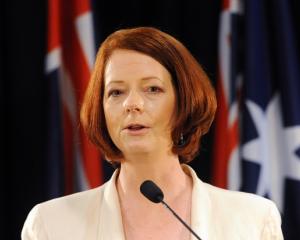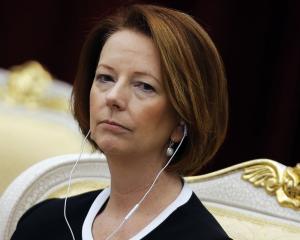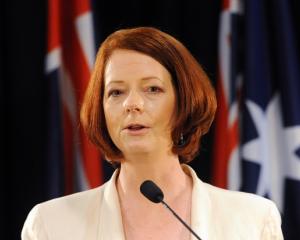New Zealand should be reassured by Australia's strength, not fear it, Australian Prime Minister Julia Gillard says.
Ms Gillard today begins the second leg of her two-day trip to New Zealand, the first Australian leader to visit since 2007.
Her visit comes as fresh concerns are raised over the large numbers of New Zealanders moving across the ditch, and over a deal that will allow more investment from Australia.
But Ms Gillard today told Radio New Zealand a strong Australia was good for New Zealand and it was not a question about big dominating small.
"Australia did get out of the global financial crisis strong. We came out with low unemployment, low debt, relatively good growth by world standards. As the world went into recession, Australia did not," she said.
"But a strong Australia is good for New Zealand. We are so closely tied that the stronger each of us is, the better it is for the other.
"So I don't think it's about fearing Australia's strength. I think it's about a genuine partnership, where Australia and New Zealand work together to give each economic opportunities, including job opportunities and there will always be a big two way exchange of people in our two countries."
Ms Gillard and Prime Minister John Key will today sign the Closer Economic Relations (CER) investment protocol, which sets a higher threshold for trans-Tasman investment that does not have to go through a screening process.
She said the agreement would make it easier to invest in both countries, which would create more jobs.
Ms Gillard will this morning be welcomed to Parliament, then make history be being the first foreign leader to address the House.
Her speech will be delivered in the debating chamber at 11am, outside regular sitting hours after the Green Party raised concerns the move would set a precedent.
Ms Gillard will also hold meetings with Mr Key and cabinet ministers before an official lunch. She will meet Labour leader Phil Goff, and hold a joint wreathlaying ceremony with Mr Key at the National War Memorial.
At a trans-Tasman business lunch yesterday in Auckland, Ms Gillard focused on the strong business relationship between New Zealand and Australia.
She referred to the strong "mateship" between the two countries and paid tribute to New Zealand's support during "Australia's summer of hardship".
She joined Mr Key at the Glen Taylor School in Glendowie, where Mr Key had launched the controversial national standards programme in 2009.
Mr Key said he wanted to show it to Ms Gillard as an example of a successful school.






